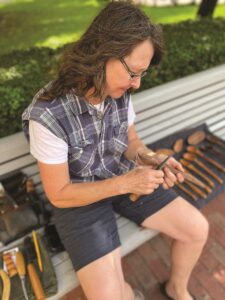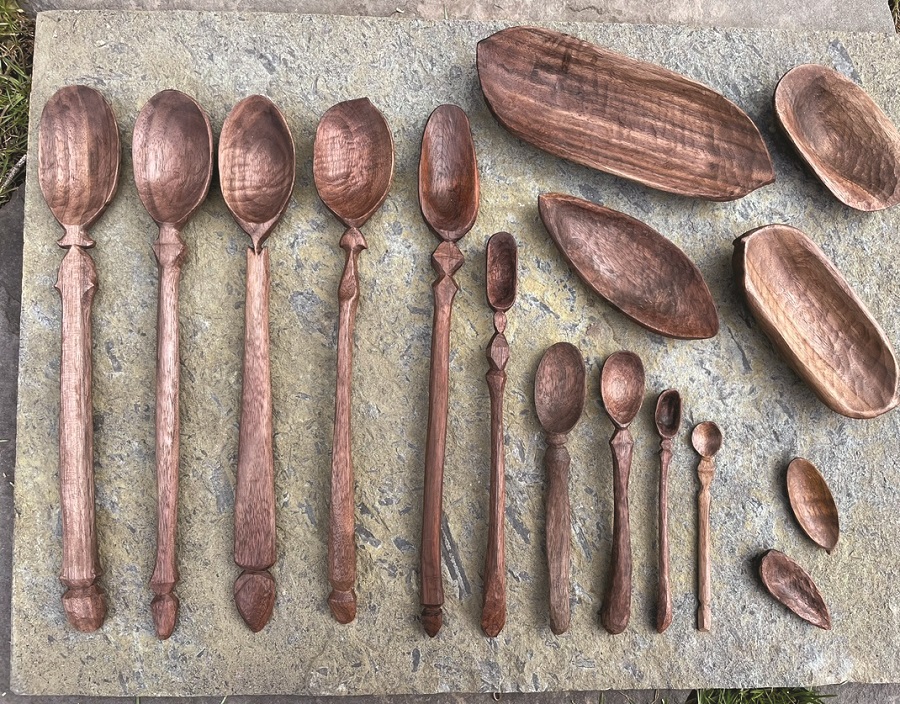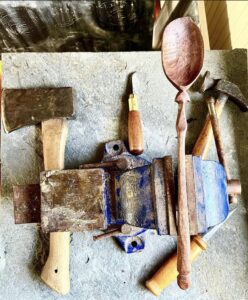PROVINCETOWN — Several customers have told Gaige Clark that her hand-carved wooden spoons are too beautiful to use. When someone tells her they’re going to hang a spoon on the wall, Clark tells them to be sure to use “really pretty old-school nails.”
The spoons, somehow both sleek and strong, are meant for cooking. Clark uses hers daily. But she admits she’s flattered when people say they’re buying them for show. Beauty matters as much as utility in Clark’s craft.

“I only choose wood with really interesting colors,” she says. She has four favorites. There’s black walnut, “which has a lot of personality and striation,” Clark says; and yew, a warm bronze; cherry wood has made its way into Clark’s lineup for its pink undertones; and finally, there’s lilac, “not really a tree,” of course. Her mauve-undertoned wood of choice is purple lilac because, she says, white lilac doesn’t have the same color.
Clark mainly uses fallen branches because, she says, her work “has to be sustainable.” She gathers most of the wood herself.
Now the proprietor of the online shop SpoonBear, Clark has been making spoons only since 2019. She was inspired by seeing the work of the Catskills-based hand carver Hoppy Quick, who she describes as a kindred spirit. He inspires her and also supplies her with black walnut.
After 25 years in the flower industry, with shops in L.A. and New York City, Clark says a certain dose of liberation comes with the solitary nature of her woodcraft. “I like that this is just me,” she says. “And that I can work anywhere.”
She heads to Provincetown in the summer (the rest of the year she is in Woodstock, N.Y.). She likes to work on the benches just outside town hall. “I’ll follow the shade,” she says.

Clark sets up for the season at the Coastal Acres Campground, but she migrates to the center of town to work because she relishes conversations with the people she meets there, some of whom end up also buying her work. “There’s a kindness from strangers that you don’t get from people you know,” she says.
In addition to color, Clark looks for heartwood, the wood from the core of the tree or branch, when selecting pieces for her spoons. She picks up a spoon decorated naturally by concentric loops — the branch’s growth rings.
Clark is also drawn to timber’s imperfections. Knots and mineral streaks punctuate the bowls of some of her spoons. “I think they make the bowls really interesting,” she says.
Once she’s selected a sizable chunk, “I’ll axe it down to a usable piece,” Clark says. From there, she draws a rough outline of the spoon that will emerge. “I’ll find the most interesting part of the heartwood, and then I’ll draw a spoon around it,” she says. Still, Clark never knows what a piece will look like until she’s completely finished it.
After axing the slab into a rudimentary spoon shape, Clark chisels the bowl, hollowing it out first, then smoothing it with a hook knife, whose curved blade is designed specifically for spoon carving. “It brings out the grain,” Clark says.

She moves down the spoon to its neck, where lately she’s been carving “sacred geometry,” she says. Clark is a trained reiki master with a former practice in Woodstock, and she’s been carving some of that philosophy into her pieces.
“It’s believed that certain shapes have certain healing properties,” she says. She’s also been knifing teardrops into her spoons: “I think people don’t talk enough about crying,” she says. “It’s nice to embrace that part of being human.”
At that last stage, a soon-to-be-spoon once snapped at the neck. Clark decided to repurpose the creation: “That’s how salt boats were born,” she says, “by mistake.” Now, Clark sells more of those than spoons. People tell her they use them for sundry things like pills and dainty necklaces.
Clark uses a sloyd knife — derived from the Swedish slöjd, meaning “handiwork” — to remove excess wood and whittle in detail. For an almost-finishing touch, she uses a finishing knife, which she says practially burnishes the wood. Finally, she applies hemp oil “to shine it up.”
Since Clark’s early crafting days, her prices have gone up, she says: she charges about $65 per salt boat and between $25 and $95 per spoon, depending on its size and the time it takes to make. Most involve between five and seven hours of labor.

Some of her prized tools are pricey, Clark says. A favorite knife, made by Matt White of Temple Mountain Woodcraft, cost $320. “It’s a work of art,” Clark says of her beloved curly willow-handled sloyd knife before returning it to its birch sheath. Axe-maker Julia Kalthoff is another inspired toolmaker, she says. The spoon carving community is small, Clark says. “If you’re really involved, you know all the key players.”
Good tools are essential, Clark says. “If you look at photographs of my beginning work, made with humble tools, you can see that the quality increased with the quality of my tools,” she says. Clark’s tool collection now contains nine sloyd knives, seven axes, 10 hook knives, 20 chisels, and two vises.
Clark has a hard time choosing a favorite among recent works. There are the spoons with sacred shapes running up their necks that look fragile but aren’t: Clark bangs one on the pedestal under the Doughboy on the town hall lawn to demonstrate its durability. Or the one with a knot placed perfectly in its bowl. A petite salt boat with warm lines curving around its oblong center is as beloved as the glossy, hefty black walnut one next to it.
She stops herself, though. The main thing, she says, is “they’re not precious.”
Editor’s note: An earlier version of this article, published in print on Aug. 3, incorrectly reported that Gaige Clark lives in Woodstock, Vt. It is Woodstock, N.Y.
